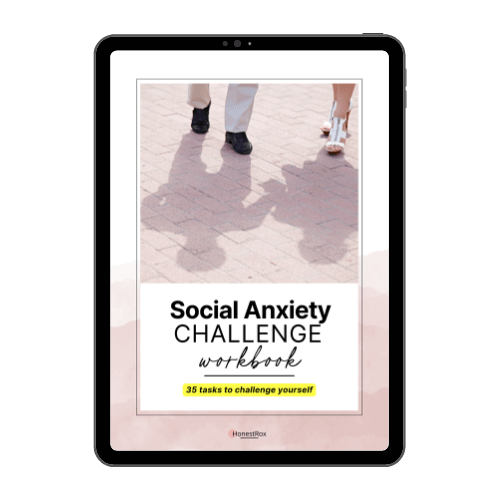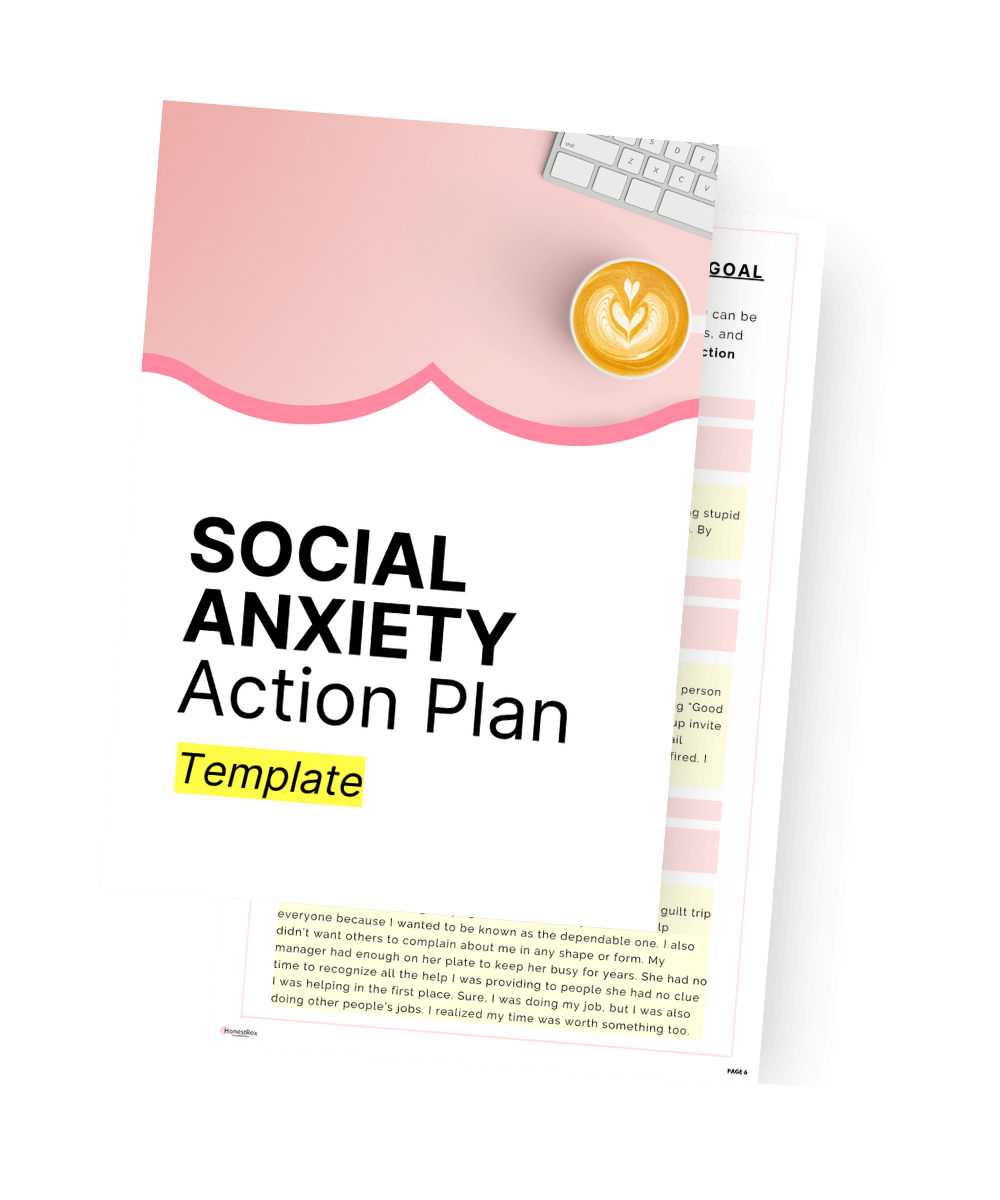
Social Anxiety
7 reasons you might be
avoiding conversations
Understand why you avoid conversations and how to ease back into them
Are you avoiding conversations?
I’d go even further and ask you if you are AFRAID of them.
I get it. I do. There’s a certain quietness in avoiding conversations—something that feels safe in a world full of noise.
There’s always that uncertainty that comes from conversing with someone. You don’t know how you’re going to feel about it, what you’ll say, or what they’ll say.
It can be stress-inducing.
I walked around too long with a “not in the mood to talk right now” sign on my forehead.
I did everything possible to avoid talking to people because I felt uncomfortable.
After so many years of trying to heal, moving from country to country, and changing careers, it became too difficult to relate to anybody because no one around me experienced life the way I did, which made it extremely difficult to connect.
That’s not to say that other people do not experience life their way, because we all have different life experiences.
Still, every time I tried to talk to somebody, the gap between where I was and where they were was too big, and there was no common ground for us to meet.
Subscribe to the "You're worth knowing" newsletter
The You’re Worth Knowing newsletter drops weekly to inspire, motivate, and educate you on embracing your true worth, rejecting societal pressures, and living authentically. Expect a mix of personal stories, real talk, and a few laughs along the way—because living boldly can be fun!
I wouldn’t even begin to fathom having to talk about my healing journey or the five projects I was working on, which, by the way, had nothing in common with each other.
My gosh, I didn’t even want to go into my plethora of identity issues and have to explain to someone “why” I moved to Amsterdam from Florida. Or how I ended up in Florida in the first place, since I was born in Romania.
I had no patience to repeat myself for the millionth time with each new acquaintance, so I avoided meeting people or running into the ones I knew.
It felt like everyone’s life was pretty straightforward, while mine was utter chaos. I had a hard time facing the chaos alone, let alone letting someone in on it. So, I retreated and avoided it.
But here’s the thing: it’s okay. Seriously.
It’s okay to be in this phase. It’s okay to avoid conversations, just as long as it doesn’t last forever.
You’re not alone. You’re not weird or broken.
The best course of action is to identify why you’re in this phase and how you can move through it to emerge invigorated and ready to have conversations with people.
But before I get into the seven reasons why you might be avoiding conversations and how to move through this phase that you’re in, based on the reason, I wanted to share that the only way I was able to move through it is to remind myself that it was just a phase.
Just telling myself this is just a phase I’m in puts me more at ease with myself.
I knew I was struggling with it and had to find my way out of it. And I eventually did.
Here are 7 reasons why you might be avoiding conversations:
1. You have a complicated background
You have layers. Your story is complex, and people don’t always understand. It takes time to explain everything, whether it’s your culture, experiences, or places you’ve lived.
A lot of time. And sometimes, it feels like people don’t care enough to listen. So, you’d rather keep it to yourself than spend another hour repeating the same things.
Here’s how to tackle this:
Instead of trying to explain everything at once, simplify your story. Pick one aspect of your background that feels relevant or comfortable to share in the moment, and let that be your starting point.
It can be as simple as, “I’m originally from Romania, and I’ve had a pretty unique journey moving around.” You don’t need to tell your whole story every time—share what feels right for you in that moment.
2. You’re in a difficult life phase
Life is hard. Sometimes, it’s a mess of emotions and events that leave you drained. You’re not in a place where you’re ready to talk about it, but your mind is consumed with everything that’s going on.
And honestly, you don’t want to hear advice that doesn’t apply. You don’t want people to say the wrong thing, even with the best intentions.
You’re just trying to survive, and it’s too much to explain right now.
Here’s how to tackle this:
It’s okay to be honest about where you’re at. You don’t need to dive into the details, but something like, “I’m going through some personal stuff right now, so I’m not really up for talking about it,” can help set the boundaries you need.
It permits you to protect your peace without feeling like you need to explain everything.
3. Starting/ending the conversation is a heavy burden
Small talk? Forget it. You can’t stand it. It feels forced, awkward, and honestly exhausting. Starting a conversation feels like a weight on your shoulders, and wrapping it up? That’s even worse.
What if it gets weird? What if you don’t know how to end it without making it uncomfortable? That anxiety makes you want to avoid the whole thing altogether.
Here’s how to tackle this:
Start small. Sometimes, a simple “Hey, how’s it going?” or even just a smile can be enough to begin a conversation without the pressure of overthinking it.
When it’s time to end, try something light and casual like, “Well, I should probably get going, but it was nice chatting!” It doesn’t have to be perfect. Practice can make those transitions feel smoother over time.

It's time to challenge social anxiety
Managing your social anxiety starts with not avoiding it. Yes, it’s a painful truth, but sitting at home, hoping it will magically disappear, never worked for anyone.
Start slowly, but start with a task!
4. You have difficulty answering the question, “What do you do?”
You’re not just one thing. A single job title or role does not define you. Maybe you’re juggling a few projects, freelancing, or building something unique.
Your work is complicated to explain, and even when you try, you can see the glazed-over look in people’s eyes. They don’t get it. And you don’t have the energy to explain it to someone who probably won’t care.
Here’s how to tackle this:
Instead of explaining everything at once, focus on your core passion or one project that excites you. Keep it short and impactful—something like, “I work on a few different projects related to personal development and healing” could be a simple and clear response. If they’re interested, they’ll ask more. If not, you’ve avoided the lengthy explanation.
5. You can’t bear awkward silences in the conversation
Those quiet moments in a conversation? They haunt you.
You worry about the silence—how it can stretch out, be uncomfortable, and be heavy.
You can already feel the anxiety building, imagining that moment when you both stare at each other, trying to figure out what to say next.
It’s a paralyzing thought, making you want to avoid talking altogether.
Here’s how to tackle this:
Embrace the silence. It’s okay for conversations to have lulls—it doesn’t mean the conversation is falling apart. You can use the silence to gather your thoughts or say, “Hmm, that’s a good question. Let me think for a second.”
If the silence gets too long, ask open-ended questions like, “What do you think about that?” to redirect the focus back to the other person.
6. You think you’re boring
You don’t feel like you have anything interesting to share. You worry people will think you’re boring, or worse, they’ll be disappointed in the conversation.
You start feeling like your life isn’t exciting enough to make it worth someone else’s time, so you don’t bother starting the conversation in the first place.
Here’s how to tackle this:
Shift your focus from worrying about being interesting to being authentic. People connect more with authenticity than with trying to be “exciting.”
Instead of worrying about boredom, ask yourself, “What part of my life or thoughts feels real to share?” It doesn’t need to be groundbreaking—just honest. You might be surprised how much others appreciate that.
7. You need your energy
Let’s be honest: conversations can be draining. So much emotional energy goes into them, especially if you’re already running on empty. You’d rather save what little energy you have for the things you need to get done or for moments of solitude where you can recharge.
Your energy is precious, and right now, you don’t want to waste it on a conversation that might not even feel worth it.
Here’s how to tackle this:
It’s all about setting boundaries. If you know you’re not in a place to have a long conversation, it’s okay to say, “I’m low on energy today, but I’d love to chat another time.”
People will understand if you set your boundaries respectfully. When you engage, try to be mindful of the energy you’re giving and how much you’re taking on so that it doesn’t drain you further.
So, if you’re avoiding conversations, know it’s not because something is wrong with you.
It’s not a weakness. It’s a survival mechanism, and sometimes, it’s necessary. Remember that taking a step back is okay, but don’t let this phase last forever.
When you’re ready, you’ll find the words, the energy, and the connections that make sense for you. You’ll get there. And until then, it’s perfectly okay to honor where you’re at.

What does it take to show up confidently?
It’s time to stop sabotaging yourself and start believing you’re worth knowing. Get the tools you need to build social confidence, manage social anxiety, and rock conversations.
There are 7 reasons you might be avoiding conversations. The best tip I have, regardless of why, is to remind yourself that it’s just a phase and won’t last forever (at least, that’s the goal).
Here are the 7 reasons you might be avoiding conversations:

I'm Roxana Claudia

I went from being scared to ask a question out loud to hosting summits online. I love coffee, French crepes, and working from home.
My mission? Help others dismantle their toxic shame so they can make friends, have conversations, and be comfortable around people!
Did you find value in my content? Buy me a coffee!
Recent blog posts
Latest Episode

About the blogger
I'm Roxana Claudia
👋 Hi, I’m Rox. Let’s work on your self-worth. More than anything, I want you to believe you’re worth knowing instead of banking on external elements making that call for you.
Like what you see here?
Check out the blog!
Must Reads
Grab these freebies
Free Challenge
5 tasks. 3 difficulty levels. Test your social anxiety through exposure therapy.
Grab these freebies
Free Template
Get the template that I personally used and create your own steps for your journey.
A podcast meant to help you be comfortably you, no matter the situation. My goal is to give you the confidence to go out into the world, share your worth, build meaningful relationships, and see yourself as highly capable. It all starts with being your awkward self comfortably.
You’re worth knowing
The You’re Worth Knowing newsletter drops weekly to inspire, motivate, and educate you on embracing your true worth, rejecting societal pressures, and living authentically. Expect a mix of personal stories, real talk, and a few laughs along the way—because living boldly can be fun!

Hi, I'm Rox!
I spent years struggling with toxic shame, which often showed up as crippling social anxiety. It held me back in so many areas of my life, making me feel unworthy and paralyzed by fear. But through years of self-discovery and healing, I finally found the tools to break free from it.












